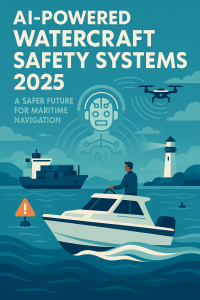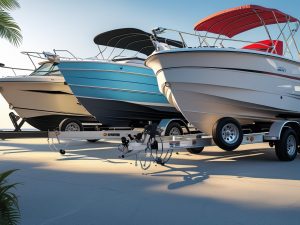Owning a boat is an exciting and rewarding experience, but it also comes with responsibilities—chief among them being boat insurance. In 2025, boat insurance requirements have become more standardized due to growing concerns about environmental protection, marine safety, and increasing recreational boating activity. Whether you’re a seasoned sailor or a first-time boat owner, understanding the latest insurance requirements is essential.
This comprehensive guide explores everything you need to know about boat insurance requirements in 2025, including policy types, coverage options, legal mandates, costs, and frequently asked questions.
What Is Boat Insurance?
Boat insurance is a specialized policy designed to protect you, your passengers, and your watercraft from a range of risks, including damage, theft, liability claims, and natural disasters. It functions similarly to auto or homeowners insurance but is tailored specifically for maritime use.
Policies may cover:
-
Physical damage to the boat
-
Liability for injuries or property damage
-
Towing and roadside assistance
-
Medical payments
-
Fuel spill and wreckage removal
Why Boat Insurance Is Necessary in 2025
With the rise in boat ownership and recreational boating activities, 2025 has seen an increase in marine accidents and environmental incidents. As a result, governments, lenders, and marinas have strengthened their boat insurance requirements.
Key reasons boat insurance is essential in 2025:
-
Legal compliance: Some states/countries now require mandatory coverage.
-
Financial protection: Covers repair/replacement costs in case of damage or theft.
-
Environmental concerns: Coverage may include fuel spill cleanup and wreckage removal.
-
Third-party liability: Protection against lawsuits or claims from others.
-
Lender requirements: Most boat loans require insurance coverage.
-
Marina access: Many marinas now mandate proof of insurance.
Is Boat Insurance Required by Law in 2025?
In 2025, boat insurance laws vary by jurisdiction. While not all states or countries require boat insurance by law, more are adopting minimum mandatory liability insurance for certain types of watercraft.
Typical legal requirements include:
-
Liability coverage: Especially for boats with high engine power.
-
Environmental liability: For fuel spills or sinking.
-
Uninsured boater coverage: To protect against other non-insured operators.
Example: In California, boat owners must carry at least $15,000 in liability coverage for boats over 50 horsepower. In Florida, insurance is not required by law, but marinas and lenders still require it.
Always check your state or country’s maritime laws for the most accurate requirements.
Types of Boat Insurance Coverage in 2025
Understanding the types of boat insurance available in 2025 will help you choose the right policy:
1. Liability Coverage
Protects you if you’re legally responsible for injury or damage to others. Often required by law or marinas.
2. Collision Coverage
Covers repair or replacement if your boat collides with another object or vessel.
3. Comprehensive Coverage
Includes theft, vandalism, weather damage, and more.
4. Uninsured/Underinsured Boater Coverage
Protects against accidents caused by other boaters who lack adequate insurance.
5. Medical Payments Coverage
Covers medical expenses for you and your passengers after an accident.
6. Towing & Assistance
Provides emergency towing, fuel delivery, and roadside help.
7. Fuel Spill Liability
Covers cleanup and environmental fines for accidental fuel discharge.
Minimum Boat Insurance Requirements by State or Country
Here is a sample of minimum insurance requirements in 2025:
| Location | Liability Insurance Requirement | Notes |
|---|---|---|
| California, USA | $15,000 – $30,000 (varies by boat type) | Required for powerboats over 50 HP |
| Ontario, Canada | $200,000 minimum third-party liability | Required for all powered vessels |
| Queensland, Australia | $250,000 minimum liability | Must include environmental liability |
| UK | £100,000 public liability for inland water use | Required for Canal and River Trust access |
| Florida, USA | Not legally required | Mandated by most marinas and lenders |
Note: These are sample figures; always verify with your local boating authority.
Who Needs Boat Insurance in 2025?
Boat insurance is recommended for anyone who owns or operates a watercraft, including:
-
Motorboats and speedboats
-
Jet skis and personal watercraft (PWC)
-
Yachts and sailboats
-
Pontoon boats
-
Houseboats
-
Fishing boats
-
Charter vessels
If your boat has an engine over 25-50 horsepower, you’re more likely to be subject to mandatory insurance regulations.
Factors That Affect Boat Insurance Premiums
Boat insurance premiums in 2025 are influenced by several factors:
-
Boat type and value
-
Engine size and horsepower
-
Navigation area (inland vs. coastal vs. international)
-
Your boating experience
-
Claims history
-
Storage type (marina vs. home dock)
-
Safety equipment onboard
-
Use type (personal, charter, or commercial)
Installing anti-theft devices and completing a boating safety course can help reduce your premiums.
How to Choose the Right Boat Insurance Policy
1. Assess Your Risks
Think about how, where, and how often you use your boat.
2. Compare Quotes
Get at least three quotes from reputable insurers.
3. Customize Coverage
Add optional protections like towing, environmental cleanup, or trailer insurance.
4. Understand Deductibles
Higher deductibles lower your premium but increase out-of-pocket expenses.
5. Review the Fine Print
Look for exclusions, limitations, and renewal terms.
Common Exclusions in Boat Insurance Policies
Even in 2025, boat insurance policies may exclude coverage for:
-
Wear and tear
-
Damage from marine life (e.g., barnacles)
-
Acts of war or terrorism
-
Operating under the influence
-
Unlicensed operators
-
Racing (unless explicitly included)
-
Failure to maintain or winterize the boat
Always read your policy carefully and ask questions before signing.
How to File a Boat Insurance Claim in 2025
-
Report the Incident Immediately
Notify the coast guard or local authority if necessary. -
Take Photos and Videos
Document damage, injuries, and scene of the accident. -
Contact Your Insurer
File your claim through their online portal or phone service. -
Provide Documentation
Include receipts, police reports, and repair estimates. -
Schedule an Inspection
Most insurers will send an adjuster to assess the damage. -
Receive Settlement or Repairs
Depending on your policy, you may receive cash or direct repairs.
Top Boat Insurance Providers in 2025
Here are some of the top-rated boat insurance companies in 2025:
| Provider | Notable Features |
|---|---|
| Progressive | Usage-based discounts, online policy management |
| Geico Marine | 24/7 claim service, agreed value coverage |
| Allstate | Multi-policy discounts, comprehensive protection |
| BoatUS (by GEICO) | Towing, on-water assistance, trailer coverage |
| State Farm | Strong customer service, customizable plans |
| Markel Insurance | Ideal for yachts and specialty boats |
Frequently Asked Questions (FAQs)
1. Is boat insurance legally required in the U.S.?
It depends on your state. While it’s not federally mandated, many states require insurance for motorboats or larger vessels.
2. How much does boat insurance cost in 2025?
On average, between $200 and $800 annually, depending on your boat type, location, and coverage options.
3. Is insurance required for jet skis and PWCs in 2025?
Yes, many jurisdictions now mandate liability coverage for personal watercraft (PWCs) like Jet Skis.
4. Can I get boat insurance if I live on my boat full-time?
Yes, but you’ll need a liveaboard policy, which is more comprehensive than standard boat insurance.
5. Does homeowners insurance cover boats?
Only in very limited cases, typically for small boats under 25 HP and worth less than $1,500.
6. What is “agreed value” vs. “actual cash value”?
-
Agreed Value: Fixed payout agreed upon at policy start.
-
Actual Cash Value: Depreciated payout based on current market value.
7. Can I pause my boat insurance in the off-season?
Some insurers offer lay-up periods, which reduce coverage and cost during inactive months.
Conclusion
Boat insurance in 2025 is more important than ever due to new legal requirements, rising accident rates, and environmental accountability. Whether you own a personal fishing boat, a luxury yacht, or a Jet Ski, having the right coverage ensures peace of mind and compliance with modern laws.
Tip: Always compare policies, read the fine print, and choose coverage based on how and where you use your boat. Consult local maritime authorities to verify your legal obligations and stay protected while enjoying the open water.







